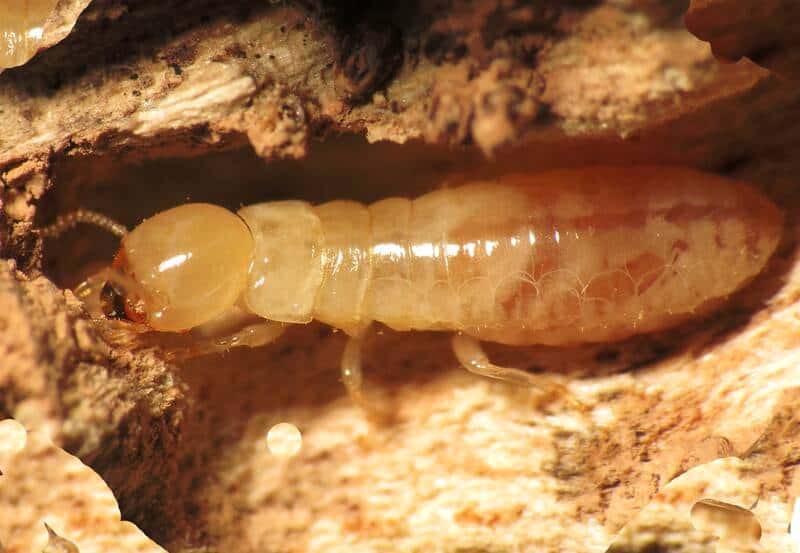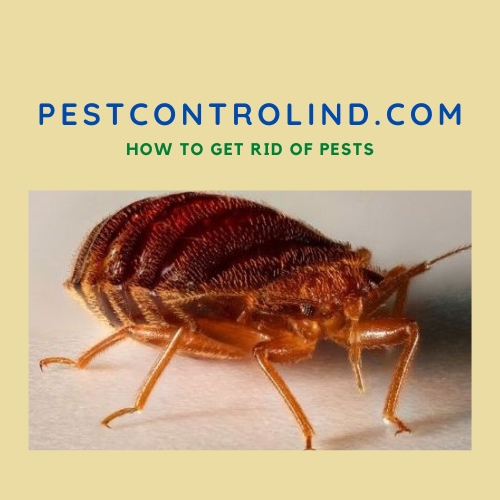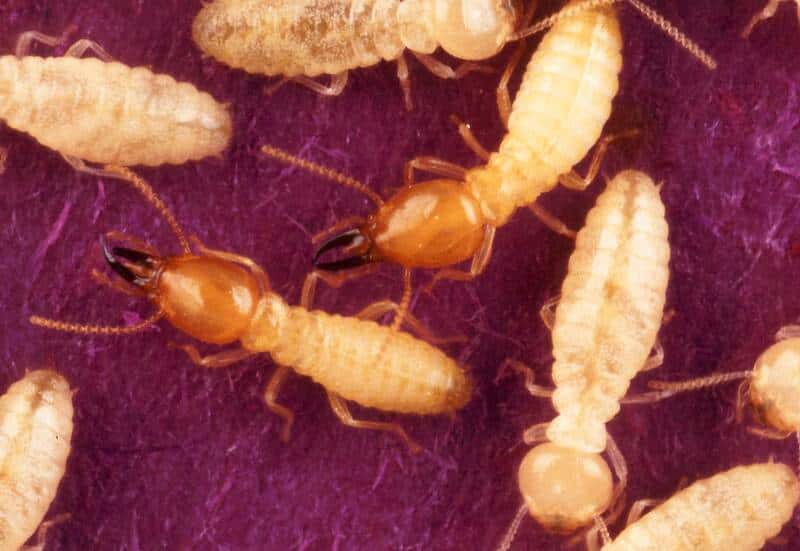Do termites bite human skin? How to prevent termite bites? Are termite bites painful? Do termites only bite in self-defense or do they proactively attack humans? What is the best way to treat a termite bite? Follow us in this article to try to answer all these questions and more:
I. What are termites?
Termites, like ants, have a caste system. And each of them is assigned a specific job in their colony.
The three classes are breeders, workers, and soldiers. Each one takes care of its specific function but can do the work of the other caste in case of an absolute emergency.
The leader of the breeders is obviously the queen, who can lay 20,000 to 30,000 eggs a day, and the king plays the role of the spawner. He will mate with the queen for the rest of his life.
The workers forage and store food, take care of the brood and keep the nest clean.
The soldier termites are responsible for defending the colony against all predators, mainly ants.
I. Do termites bite human skin?
1. Do they sting or bite?
Termites are wood-boring insects that cannot bite. They do not have stingers that could stick to the skin of a human or a pet. However, some species of termites do have mandibles and pincers that could potentially dig into the skin.
Biting a human is such a rare occurrence that it is almost never reported.
2. What do termite bites look like on humans?
Termites are usually so small that they have tiny pincers. Their bite, when it occurs, is so tiny that it would not be noticeable to the naked eye.
And if there is no allergic reaction, their bite is hardly noticeable even if you feel it.
If the skin reacts to the bite, it is noticeable by a red swelling at the bite site. This is a natural reaction of the immune system that releases histamine, a natural chemical mediator, which causes swelling, redness, and itching at the bite site.
3. Are termite bites painful?
You hardly feel them at all. Their effects on the human body are minimal.
Note that there are not enough testimonies on this issue.
4. Can termites harm humans?
Termites are not known to medically harm humans or pets. However, the damage they can cause in a home is sometimes quite dangerous to humans.
There have even been reports of houses collapsing on their occupants due to the termites’ long work in the wood of their homes.
5. termite bite symptoms
In most cases, a termite bite does not leave any marks on the human skin. However, it can happen to have an allergic reaction that varies from person to person.
In this case, the symptoms are almost the same as those produced by any insect bite. Among these symptoms, we can mention:
- Hives and itching
- Redness of the skin
- Pimples
- Fever
6. termite bites on baby
Babies are much more susceptible than adults and children to insect bites and stings.
Their delicate skin quickly becomes reddish and their immune system is much more reactive because it is not yet used to external attacks, especially by stings and the various poisons that insects inject into the circular system of their victims.
Termites, as has been said many times, are not at all a danger to humans. They prefer to stay in their woods or underground to take care of their colony.
7. do termite bites itch
No in most cases. They only itch when the bitten person develops an allergic reaction. This is a consequence of the body’s production of histamines in reaction to the insect’s saliva, which it rightly considers to be a potentially dangerous foreign body.
8. Can termite bites cause allergic reactions in humans?
Yes, this is the only danger of termite bites. Some people, for reasons still unknown to science, may have a sensitivity to certain insect bites and stings.
If this is the case, you should always consult your doctor as a matter of urgency to avoid the aggravation of the bite.
9. Do termites only bite in self-defense, or do they attack humans proactively?
Termites almost never attack humans. They do not consider humans a danger to their survival. They are much more afraid of ants.
10. Do different types of termites have different bite characteristics?
In addition to the different types of termites found within a colony, there are also different species of termites, they are generally grouped into three different species depending on where they build their nests:
Subterranean termites:
This is the most common type of termite. This species does not live in the wood, it lives on the ground, under the earth, and it goes into the wood to get the food it needs for the rest of the colony. They can cause severe damage to buildings.
Forest termites:
This type of termite feeds on decaying wood and is usually more prevalent in gardens or outdoor areas. They are most abundant in the United States.
Drywood termites:
These are the termites that nest inside the wood, they live off their own food source. They tend to abound in the Mediterranean region. Their termite mounds usually number between 1,000 and 1,500 individuals and can cause major problems in the structural elements of homes.
The bites of each of them have no particular characteristics.
11. Can termites transmit diseases to humans through bites?
No. To date, there are no known cases of disease transmission from this xylophagous insect to a human or domestic animal. There is no need to be afraid of them.
However, a termite infestation in the wood of a house can cause considerable danger for the occupants of the house. It may collapse on them.
12. Are children or pets more susceptible to termite bites than adults?
Animals are generally less susceptible to insect bites than humans. They have thicker fur, hair, and skin. They will probably be less sensitive to a termite bite.
However, children are always more sensitive than animals and adult humans. They have thin, delicate skin and more intense immune reactions.
Remember that termite almost never bites humans, including children and babies.
II. What is the best way to treat a termite bite?
If a termite bites you and you have felt discomfort and itching, here are some tips you can apply to mitigate the negative effects of the bite as soon as possible:
- Gently clean the bite area with soap and water, avoiding excessive scrubbing. This way, you avoid secondary infections.
- In case of remarkable itching, you can use a product containing ammonia. In this way, you can stop the itching and irritation, as well as neutralize the insect’s saliva.
- Take an oral antihistamine, previously indicated by the pediatric allergist.
- You can also apply a topical corticosteroid, which has also been indicated by an allergist.
III. How do you prevent termite bites?
The best way to prevent termite bites, even if they are rare, is to get rid of them completely from your home and avoid any contact with them.
An infested house or garden will always remain a threat to yourself and your children, and sometimes even to your pets.
The treatment against these insects remains a good solution to avoid undergoing damage which is sometimes very dangerous.
And if you notice their presence while waiting for professional treatment, you can for example apply these tips:
- Shake out the clothes before using them if we have them hanging outside or very close to wooden walls.
- Clean your house continuously and don’t leave anything lying around to avoid hiding places near your bed.
- Keep the bed away from wooden walls.

IV. Other Questions about termite Bite
1. Can termites get in your hair?
This is a very rare occurrence but it can happen. If one has an infestation at home, there will always be a risk of a termite falling on their head.
2. Can termites go in your ear?
Theoretically, this is a very exceptional case. As mentioned above, termites avoid contact with humans and animals as much as possible.
They are mainly concerned with taking care of their colony.
3. What are termites attracted to?
Termites have a predilection for wood, paper and cardboard structures, artwork, and other stored products where this type of material is present.
Here are some factors that can influence termite proliferation:
- Houses, blocks, and detached homes are the perfect breeding ground for a termite infestation to eventually appear.
- If we have wood in close proximity to our home, we will attract termites.
- Remember that these insects are able to detect the smell of decaying vegetation. If they get close enough and smell wood inside the building, they will not hesitate to attack.
- Wet environments increase the risk of attack.
4. Can you get sick from termites?
Insect bites produce at most a local inflammatory reaction in the area of the bite.
Termites usually do not cause any local reaction, and if they do, treatment usually consists of medication applied directly to the bite area.
In some people, who are sensitive to them, the reactions can be much more severe. For this reason, these people should always carry self-injectable epinephrine to avoid anaphylactic shock.
5. Can termites travel in a suitcase?
Yes, it is possible, especially if the suitcase is damp, and made of wood and cardboard. But it is very rare. A queen almost never leaves her colony except by accident.
6. Can termites live on human skin?
No.
7. Can termites cause structural damage to my home that puts my family’s safety at risk?
Termites, if not dealt with in a timely manner, can cause severe damage to homes and threaten entire livelihoods. They can be the cause of the collapse of a part of the house, which is a danger to family members.
It is always advisable to make regular checks for their presence to make sure. And once detected, they should be eliminated as soon as possible.11. How can I tell if I have a termite infestation in my home?
8. How do I know if I have a termite infestation in my home?
One of the most common ways for termites to enter your home is through the contact of wood with the floor, including door frames, deck posts, steps or porch supports.
Termites also enter homes through cracks in the foundation and cracks in brick mortar. Sometimes they even use holes in concrete blocks to break through foundation walls.
Termites like to digest wood that has an acceptable moisture level. In this way, they can consume water indirectly by eating wood, which has the ability to retain moisture.
For example, wet wood termites feed on fallen tree stumps, but they can also attract other types of termites to the area.
First, consider that termite nests are difficult to detect. These insects often hide from sunlight and move inside wooden structures or beams.
Some signs:
Knowing their most common habits is therefore a great advantage in identifying their tracks:
- The Sounds they emit in the wood are not detectable by the human ear. Special instruments are needed to detect them.
- See the flying termites. Within termite mounds, not all isopterans are characterized by the same physiognomy conditions. Breeders have wings to colonize new habitats during breeding seasons.
- Mud beads on the wall or wood. They create these to protect themselves from light and air while moving through difficult-to-cross elements. This is a very obvious sign of termites.
- Tunnels in wood.
- The effects of termites on wood produce a great weakening of the material. A hollow sound or its destruction when touched would mean a high probability of them hanging around your facilities.
- Termite droppings. We can find them in the form of small black marks and a dark powder near the infected areas. Its appearance is compared to the seeds of plants.

